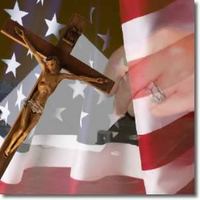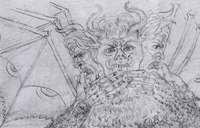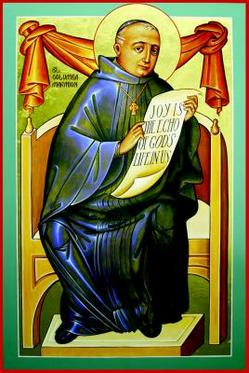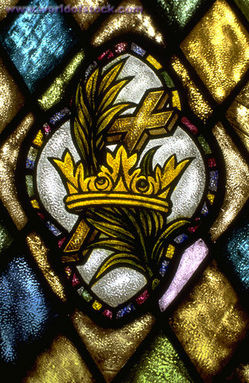The Easter Message 2009
His Beatitude, Archbishop Fouad Twal
Latin Patriarch of Jerusalem
We have arrived at the doorstep of Holy Week, the great week, which is the summit of the Christian year. During this blessed week, God gives us the grace to relive the event of our salvation: with Jesus, and in Jesus, we pass from death to life, we strip off the old man in order to clothe ourselves with the new man. This week is the synthesis of our entire Christian life.
 Let’s be clear about this. The account of the Passion, of the Death and the Resurrection of our Lord Jesus does not just relate to historical events already completed, events that we drag out from a dusty tome in order to give pious remembrance to them, but which nonetheless remain outside of the real drama and tragedies that are being played out in our lives. No, in these feasts we find ourselves on the inside of the drama, the same drama that is being played out within us. We are participants in the mystery of salvation, and the mystery of salvation is accomplished in us! This is because we recognize ourselves very well in each one of the characters of the Pascal event: in Jesus and his suffering, those same sufferings that each one of us must undergo in the course of our lives: hunger, betrayal, exhaustion, injustice… in Peter, so impulsive and generous, but ever so vulnerable; in Judas and the apostles; in Pilate and in the chief priests, who judge and strike out without mercy; in the crowd that now is cheering and then roaring in its hate; in the Virgin Mary, whose heart is pierced by a sword, but who accompanies Jesus along his way of the cross and stays by his side in the most dramatic moments in a total and confident abandonment; in the soldiers who mock him, strike him and are completely indifferent to the sufferings of the Christ; in Veronica and the other holy women who weep and attempt to assuage the sufferings of his Mother; in Simon the Cyrene and Joseph of Arimathea; in the good thief who calls on Jesus and manages, in the very last moments of his life, to snatch for himself paradise itself… In the course of our lives, we are in turn each one of these characters.
Let’s be clear about this. The account of the Passion, of the Death and the Resurrection of our Lord Jesus does not just relate to historical events already completed, events that we drag out from a dusty tome in order to give pious remembrance to them, but which nonetheless remain outside of the real drama and tragedies that are being played out in our lives. No, in these feasts we find ourselves on the inside of the drama, the same drama that is being played out within us. We are participants in the mystery of salvation, and the mystery of salvation is accomplished in us! This is because we recognize ourselves very well in each one of the characters of the Pascal event: in Jesus and his suffering, those same sufferings that each one of us must undergo in the course of our lives: hunger, betrayal, exhaustion, injustice… in Peter, so impulsive and generous, but ever so vulnerable; in Judas and the apostles; in Pilate and in the chief priests, who judge and strike out without mercy; in the crowd that now is cheering and then roaring in its hate; in the Virgin Mary, whose heart is pierced by a sword, but who accompanies Jesus along his way of the cross and stays by his side in the most dramatic moments in a total and confident abandonment; in the soldiers who mock him, strike him and are completely indifferent to the sufferings of the Christ; in Veronica and the other holy women who weep and attempt to assuage the sufferings of his Mother; in Simon the Cyrene and Joseph of Arimathea; in the good thief who calls on Jesus and manages, in the very last moments of his life, to snatch for himself paradise itself… In the course of our lives, we are in turn each one of these characters.
But the One who attracts us most of all, who touches us, moves us and transforms what is inside of us, this is Jesus the Christ. It is He. During all this Holy Week, we must never allow ourselves to take our eyes off of Him… For it is towards Jesus that we have to turn our eyes and hearts “to know him and the power of his resurrection and the sharing of his sufferings by being conformed to his death, if somehow [we] may attain the resurrection from the dead.” (Phil 3:10-11)
Here we have Jesus, the Messiah, the one who we cheered so much just a few days ago on Palm Sunday, who staggers out of Pilate’s house bearing upon his shoulders the heavy cross. His path moves through those narrow, winding and steep streets of Jerusalem. We follow this scene, but from a distance; in this way no one notices our presence… We are too afraid of ending up like him, suffering and dying. The soldiers shout and strike the Lord in order to stir up within him the last dregs of energy that he has left. Look, Jesus falls. To see our Lord fall, the same one who we beheld in all his glory on Mount Tabor… Three times he falls, but struggles up again and just barely manages to continue on his “via crucis.”
He finally arrives at Golgotha, and there is crucified between two criminals. Mary his mother is near him, with two other women. John is there also. What a terrible sight. It is too much to bear… Our hearts are torn between compassion and revulsion – compassion for the Master who suffers this martyrdom though “he has done nothing wrong.”(Is 53:9) On the contrary: “He always went about doing good.”(Acts 10:38). How things have turned around, that this Lord here, who so many times showed his power in words, lets these men have their way with him and stands there mute “like a sheep before its shearers.” This Lord here who so many times revealed his power in gestures, hangs there impotent… We too sometimes are tempted to say with the chief priests: “Let him come down from the cross now! Save yourself, you who saved so many others! (Mt 27:42)
Seeing Jesus on the cross really puts our faith to the test. He performed so many signs during his public ministry… but this time, where is the sign? What can be the meaning of all this? And here is Jesus shouting out in a loud voice: “My God, My God, why have you abandoned me?” (Mt 27:26) Then he expires. He is dead. It is finished.
Why stay here to watch this, to look upon this pitiful failure? Let’s go home.
 Today is Holy Saturday. It is all emptiness. The Lord is dead. Our fondest hopes have taken flight and departed. We are gathered here with the apostles and their disciples, and we brood over our sadness, our disappointment but also our shame and our guilt at not having “been up to the task.” The only comfort that we find in our midst comes from Mary his Mother. She suffers, you can see that, but at the same time she is at peace. She invites us to believe, to hope against all hope. Jesus can neither be deceived nor deceive us. The truth will come to light. When? How? And what has all this been for? This is the day of “why’s”, but still no answer comes. Still there is Mary whose mother’s heart beats with an unutterable premonition. Mary believes with her whole heart, with her whole soul and with all her strength. We do as she does.
Today is Holy Saturday. It is all emptiness. The Lord is dead. Our fondest hopes have taken flight and departed. We are gathered here with the apostles and their disciples, and we brood over our sadness, our disappointment but also our shame and our guilt at not having “been up to the task.” The only comfort that we find in our midst comes from Mary his Mother. She suffers, you can see that, but at the same time she is at peace. She invites us to believe, to hope against all hope. Jesus can neither be deceived nor deceive us. The truth will come to light. When? How? And what has all this been for? This is the day of “why’s”, but still no answer comes. Still there is Mary whose mother’s heart beats with an unutterable premonition. Mary believes with her whole heart, with her whole soul and with all her strength. We do as she does.
Resurrection Sunday: We have trouble believing what Mary Magdalene and the women have come to tell us. They say that they have seen the Lord alive! They say that we are to wait for him in Galilee. Women’s talk, nothing more…
And yet… And yet, if it’s true…
Here are Peter and John racing to the tomb. We follow them. Our hearts are pounding in our chests… What has happened? Has someone taken his corps off somewhere? The Romans? The Sanhedrin? No, no we have an inkling that something else has happened. The fragments and half phrases of the Lord, which were lying dormant in us, rush back to our memory. “The Son of Man is to be handed over to men, and they will kill him, and he will be raised on the third day.” (Mt 17:22) Are not those the same words that the angels spoke to the women? But whatever can it mean to “be raised” from the dead? In the tomb, the corps has disappeared! And this cannot have been a robbery since, just as the women and Mary Magdalene confirmed, everything is in its place: there is the shroud, empty on the inside, in the very same place where the corps had been lain… there is the cloth that surrounded the Lord’s head, collapsed in on itself…
Could the women, then, have been telling the truth? The Lord, who was dead, could he be alive? With the eleven disciples, we hurry on to Galilee, to the mountain that Jesus mentioned. The Lord is waiting for us in Galilee. Galilee, our Church, our home, it is there that we performed our service; Galilee, that is the place where the Lord sent us to be joyous witnesses of His death and resurrection.
We come to the mountain. The Lord is there! Yes, it is really him! He is different and yet the same. Yes, it is really us! The same, and yet so different. With Thomas we cry out: “My Lord and my God!” With Mary, we say with our whole heart: “Rabbi.” Yes, Christ is risen! He is truly risen!
The adventure now continues. Or rather, it now begins again, all new! For ourselves, for
 our country, for our Church. Salvation has been accomplished and must be proclaimed to all men. Once again, Easter has taken place in our Churches, in our houses, in our towns and villages, in our parish communities, monasteries and convents, in our souls and our hearts, on the beautiful faces of all of our dear pilgrims and tourists. Halleluiah rings out once again far and wide!
our country, for our Church. Salvation has been accomplished and must be proclaimed to all men. Once again, Easter has taken place in our Churches, in our houses, in our towns and villages, in our parish communities, monasteries and convents, in our souls and our hearts, on the beautiful faces of all of our dear pilgrims and tourists. Halleluiah rings out once again far and wide!
This is our feast! And participating in our joy, Jesus says to each one: “I am with you always, until the end of the age.”
 In the April 13, 2009 issue of Newsweek, Jon Meacham wrote the article, “The End of Christian America,” exploring the idea that we are living in a time where many of those who identified themselves as Christians are now saying that they are skeptical about religion. Some have gone beyond skepticism and rejected religion altogether. In his article Meacham points out something that I find startling indeed: since 1990 the percentage of Americans who no longer claim a religious affiliation as risen from 8 to 15%. Plus, this group of religious non-affiliated has risen in the Northeast. Is this trend pointing to a real crisis or is Meacham creating havoc for the Church? Are Americans accepting secularlity over salvation? Are Christians to blame?
In the April 13, 2009 issue of Newsweek, Jon Meacham wrote the article, “The End of Christian America,” exploring the idea that we are living in a time where many of those who identified themselves as Christians are now saying that they are skeptical about religion. Some have gone beyond skepticism and rejected religion altogether. In his article Meacham points out something that I find startling indeed: since 1990 the percentage of Americans who no longer claim a religious affiliation as risen from 8 to 15%. Plus, this group of religious non-affiliated has risen in the Northeast. Is this trend pointing to a real crisis or is Meacham creating havoc for the Church? Are Americans accepting secularlity over salvation? Are Christians to blame?







